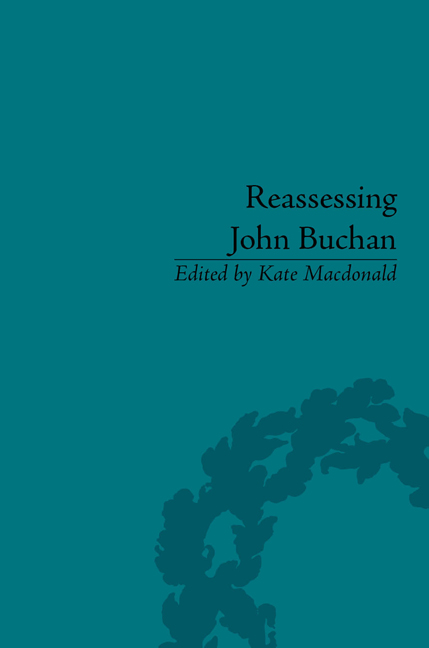Book contents
- Frontmatter
- CONTENTS
- List of contributors
- Introduction
- I Cultural Roots
- II Divided Loyalties
- III Literary Art
- 12 ‘A Fraud Called John Buchan’: Buchan, Joseph Conrad and Literary Theft
- 13 Aphrodite rejected: Archetypal Women in Buchan's Fiction
- 14 John Buchan: Politics, Language and Suspense
- 15 Buchan's Supernatural Fiction
- 16 The Anarchist's Garden: Politics and Ecology in John Buchan's Wastelands
- 17 Tracing The Thirty-Nine Steps
- Notes
- Works Cited
- Index
15 - Buchan's Supernatural Fiction
from III - Literary Art
- Frontmatter
- CONTENTS
- List of contributors
- Introduction
- I Cultural Roots
- II Divided Loyalties
- III Literary Art
- 12 ‘A Fraud Called John Buchan’: Buchan, Joseph Conrad and Literary Theft
- 13 Aphrodite rejected: Archetypal Women in Buchan's Fiction
- 14 John Buchan: Politics, Language and Suspense
- 15 Buchan's Supernatural Fiction
- 16 The Anarchist's Garden: Politics and Ecology in John Buchan's Wastelands
- 17 Tracing The Thirty-Nine Steps
- Notes
- Works Cited
- Index
Summary
John Buchan, known principally for a series of espionage thrillers, is also the author of a large number of supernatural stories. His attraction to the genre, while indicating his eclectic interests, was both aesthetic and pragmatic. From the point of view of style, supernatural fiction contains the same essential ingredients as his ‘shockers’: excitement, mystery, suspense. Secondly, Buchan ‘wrote to be read’, and in his day, supernatural stories habitually drew a large audience. Modern ignorance of Buchan's contribution to this genre may be the result of the popularity of his other books: the nearest he came to a collection of supernatural stories was The Watcher by the Threshold (1902), but this book has ‘constantly been overshadowed by his other work’. While novels like Prester John (1910), The Dancing Floor (1926), Witch Wood (1927) and The Gap in the Curtain (1932) contain supernatural elements, Buchan's most consistent work in the genre is to be found in his short fiction. He wrote around twenty supernatural short stories, from the 1890s to the 1930s, proving that he had ‘an abiding interest in the supernatural’. But because the stories appeared over many years and in various publications, they have not been considered as a contained body of work worthy of serious study.
Buchan's supernatural stories have been included in anthologies, but they have only recently been collected in single-author volumes. To date (to the best of my knowledge), five such collections have appeared. Many of the selections are confusing, however, because a number of the stories have no supernatural content. This reflects the difficulties some editors have in defining the supernatural, a difficulty compounded by the fact that Buchan's stories are variously presented as examples of supernatural, horror, and of fantasy fiction, categories which many specialists working in the field regard as mutually exclusive. Defining the term ‘supernatural’ as it applies to literature is, in fact, a doomed enterprise, for the supernatural resists precise definition.
- Type
- Chapter
- Information
- Reassessing John BuchanBeyond the Thirty Nine Steps, pp. 183 - 192Publisher: Pickering & ChattoFirst published in: 2014



